Vermes, Switzerland
Vermes (French pronunciation: [vɛʁm]) is a former municipality in the district of Delémont in the canton of Jura in Switzerland. The municipalities of Montsevelier, Vermes and Vicques merged on 1 January 2013 into the new municipality of Val Terbi.[1]
Vermes | |
|---|---|
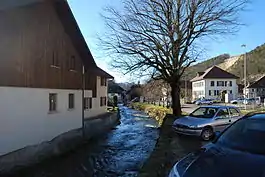 Vermes village | |
 Coat of arms | |
Location of Vermes | |
 Vermes 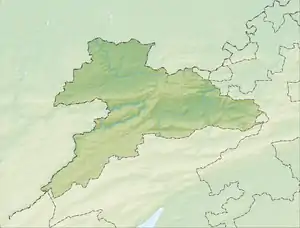 Vermes | |
| Coordinates: 47°20′N 07°29′E | |
| Country | Switzerland |
| Canton | Jura |
| District | Delémont |
| Area | |
| • Total | 18.32 km2 (7.07 sq mi) |
| Elevation | 566 m (1,857 ft) |
| Population (2011) | |
| • Total | 321 |
| • Density | 18/km2 (45/sq mi) |
| Time zone | UTC+01:00 (Central European Time) |
| • Summer (DST) | UTC+02:00 (Central European Summer Time) |
| Postal code(s) | 2829 |
| SFOS number | 482 |
| Surrounded by | Rebeuvelier, Vicques, Courchapoix, Corban, Mervelier, Schelten(BE), Elay(BE), Corcelles(BE), Crémines(BE) |
| Website | www SFSO statistics |
History
Very little is known about the early centuries of Vermes. The village is first mentioned in 769 by the name of Verteme, supposedly derived from the Gaulish word vertima, meaning mountain top. It is again mentioned in 866 as Vertima and in 1308 as Vermunt.[2]
The village of Vermes has its origins in the Saint Paul monastery, which was built in the 7th century by monks of the order of Saint Columban of Luxeuil. The abbot of Luxeuil Saint Waldebert has appointed Saint Germanus of Granfelden abbot of Moutier; at the same time he was assigned the smaller monasteries of Vermes and Saint-Ursanne. Saint Germanus governed the monasteries for 35 years, leading into an era of expansion and prosperity. In the 9th century the Columban Rule was abandoned and Saint Paul transformed into a Benedictine monastery. After nearly three centuries of existence, the Saint Paul monastery of Vermes was most likely dissolved around the year 962 by the sons of Liutfried VI, Count of Upper Alsace. The remains of the monastery are still clearly visible upon Sur les Clos in Vermes.
Geography
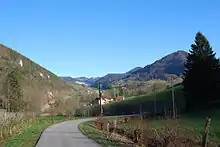
Vermes had an area of 18.3 km2 (7.07 sq mi).[3] Of this area, 7.08 km2 (2.73 sq mi) or 38.7% is used for agricultural purposes, while 10.42 km2 (4.02 sq mi) or 56.9% is forested. Of the rest of the land, 0.65 km2 (0.25 sq mi) or 3.6% is settled (buildings or roads), 0.04 km2 (9.9 acres) or 0.2% is either rivers or lakes and 0.06 km2 (15 acres) or 0.3% is unproductive land.[4]
Of the built up area, housing and buildings made up 1.6% and transportation infrastructure made up 1.5%. Out of the forested land, 53.8% of the total land area is heavily forested and 3.1% is covered with orchards or small clusters of trees. Of the agricultural land, 4.0% is used for growing crops and 20.1% is pastures and 14.4% is used for alpine pastures. All the water in the municipality is flowing water.[4]
The former municipality is located in the Delemont district, in the val Terbi. It consists of the village of Vermes, the hamlet of Envelier and Raymontpierre Castle.
Coat of arms
The blazon of the municipal coat of arms is Or, a Bend Azure between two Trefoils Vert in bend counterposed.[5]
Demographics
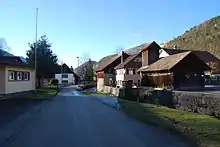
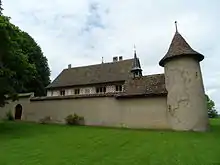
Vermes has a population (as of 2011) of 321.[6] As of 2008, 3.9% of the population are resident foreign nationals.[7] Over the last 10 years (2000–2010) the population has changed at a rate of 7.8%. Migration accounted for 11.7%, while births and deaths accounted for -2.9%.[8]
Most of the population (as of 2000) speaks French (222 or 69.6%) as their first language, German is the second most common (90 or 28.2%) and English is the third (5 or 1.6%). There are 2 people who speak Italian.[9]
As of 2008, the population was 52.1% male and 47.9% female. The population was made up of 167 Swiss men (50.3% of the population) and 6 (1.8%) non-Swiss men. There were 152 Swiss women (45.8%) and 7 (2.1%) non-Swiss women.[10] Of the population in the municipality, 133 or about 41.7% were born in Vermes and lived there in 2000. There were 56 or 17.6% who were born in the same canton, while 88 or 27.6% were born somewhere else in Switzerland, and 30 or 9.4% were born outside of Switzerland.[9]
As of 2000, children and teenagers (0–19 years old) make up 24.5% of the population, while adults (20–64 years old) make up 56.4% and seniors (over 64 years old) make up 19.1%.[8]
As of 2000, there were 115 people who were single and never married in the municipality. There were 146 married individuals, 33 widows or widowers and 25 individuals who are divorced.[9]
As of 2000, there were 130 private households in the municipality, and an average of 2.4 persons per household.[8] There were 40 households that consist of only one person and 11 households with five or more people. In 2000, a total of 128 apartments (65.3% of the total) were permanently occupied, while 57 apartments (29.1%) were seasonally occupied and 11 apartments (5.6%) were empty.[11] The vacancy rate for the municipality, in 2010, was 1.98%.[8]
The historical population is given in the following chart:[2][12]

Politics
In the 2007 federal election the most popular party was the SPS which received 50.7% of the vote. The next three most popular parties were the SVP (23.47%), the CVP (12.21%) and the CSP (9.39%). In the federal election, a total of 109 votes were cast, and the voter turnout was 42.2%.[13]
Economy
As of 2010, Vermes had an unemployment rate of 2.5%. As of 2008, there were 58 people employed in the primary economic sector and about 19 businesses involved in this sector. 7 people were employed in the secondary sector and there were 3 businesses in this sector. 25 people were employed in the tertiary sector, with 11 businesses in this sector.[8] There were 146 residents of the municipality who were employed in some capacity, of which females made up 41.8% of the workforce.
In 2008 the total number of full-time equivalent jobs was 66. The number of jobs in the primary sector was 44, of which 42 were in agriculture and 2 were in forestry or lumber production. The number of jobs in the secondary sector was 6, all of which were in manufacturing. The number of jobs in the tertiary sector was 16. In the tertiary sector; 4 or 25.0% were in wholesale or retail sales or the repair of motor vehicles, 8 or 50.0% were in a hotel or restaurant, 3 or 18.8% were in education.[14]
In 2000, there were 9 workers who commuted into the municipality and 82 workers who commuted away. The municipality is a net exporter of workers, with about 9.1 workers leaving the municipality for every one entering.[15] Of the working population, 9.6% used public transportation to get to work, and 52.7% used a private car.[8]
Religion
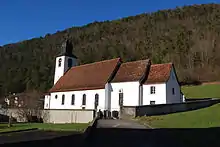
From the 2000 census, 184 or 57.7% were Roman Catholic, while 42 or 13.2% belonged to the Swiss Reformed Church. Of the rest of the population, there were 84 individuals (or about 26.33% of the population) who belonged to another Christian church. There were 2 (or about 0.63% of the population) who were Islamic. There were 1 individual who belonged to another church. 37 (or about 11.60% of the population) belonged to no church, are agnostic or atheist, and 11 individuals (or about 3.45% of the population) did not answer the question.[9]
Education
In Vermes about 101 or (31.7%) of the population have completed non-mandatory upper secondary education, and 23 or (7.2%) have completed additional higher education (either university or a Fachhochschule). Of the 23 who completed tertiary schooling, 56.5% were Swiss men, 26.1% were Swiss women.[9]
The Canton of Jura school system provides two year of non-obligatory Kindergarten, followed by six years of Primary school. This is followed by three years of obligatory lower Secondary school where the students are separated according to ability and aptitude. Following the lower Secondary students may attend a three or four year optional upper Secondary school followed by some form of Tertiary school or they may enter an apprenticeship.[16]
During the 2009-10 school year, there were a total of 26 students attending 2 classes in Vermes. There were no kindergarten classes in the municipality.[17] The municipality had 2 primary classes and 26 students.[18] There are only nine Secondary schools in the canton, so all the students from Vermes attend their secondary school in another municipality.
As of 2000, there were 27 students from Vermes who attended schools outside the municipality.[15]
References
- Amtliches Gemeindeverzeichnis der Schweiz Archived May 13, 2016, at the Wayback Machine published by the Swiss Federal Statistical Office (in German) accessed 2 January 2013
- Vermes in German, French and Italian in the online Historical Dictionary of Switzerland.
- Arealstatistik Standard - Gemeindedaten nach 4 Hauptbereichen
- Swiss Federal Statistical Office-Land Use Statistics 2009 data (in German) accessed 25 March 2010
- Flags of the World.com Archived March 3, 2016, at the Wayback Machine accessed 22-December-2011
- Swiss Federal Statistics Office – STAT-TAB Ständige und Nichtständige Wohnbevölkerung nach Region, Geschlecht, Nationalität und Alter (in German) accessed 3 October 2012
- Swiss Federal Statistical Office - Superweb database - Gemeinde Statistics 1981-2008 (in German) accessed 19 June 2010
- Swiss Federal Statistical Office Archived January 5, 2016, at the Wayback Machine accessed 22-December-2011
- STAT-TAB Datenwürfel für Thema 40.3 - 2000 Archived April 9, 2014, at the Wayback Machine (in German) accessed 2 February 2011
- Canton Jura Statistics- Population résidante permanente au 1er janvier 2010, canton du Jura et communes Archived April 26, 2012, at the Wayback Machine (in French) accessed 2 March 2011
- Swiss Federal Statistical Office STAT-TAB - Datenwürfel für Thema 09.2 - Gebäude und Wohnungen Archived September 7, 2014, at the Wayback Machine (in German) accessed 28 January 2011
- Swiss Federal Statistical Office STAT-TAB Bevölkerungsentwicklung nach Region, 1850-2000 Archived September 30, 2014, at the Wayback Machine (in German) accessed 29 January 2011
- Swiss Federal Statistical Office, Nationalratswahlen 2007: Stärke der Parteien und Wahlbeteiligung, nach Gemeinden/Bezirk/Canton (in German) accessed 28 May 2010
- Swiss Federal Statistical Office STAT-TAB Betriebszählung: Arbeitsstätten nach Gemeinde und NOGA 2008 (Abschnitte), Sektoren 1-3 Archived December 25, 2014, at the Wayback Machine (in German) accessed 28 January 2011
- Swiss Federal Statistical Office - Statweb (in German) accessed 24 June 2010
- EDK/CDIP/IDES (2010). Kantonale Schulstrukturen in der Schweiz und im Fürstentum Liechtenstein / Structures Scolaires Cantonales en Suisse et Dans la Principauté du Liechtenstein (PDF) (Report). Retrieved 24 June 2010.
- Effectifs de l'école enfantine 2009-2010 Archived April 14, 2012, at the Wayback Machine (in French) accessed 19 December 2011
- Effectifs de l'école primaire (in French) accessed 19 December 2011